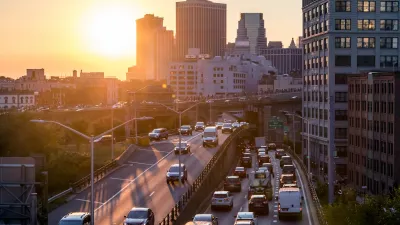The Department of Transportation under President Bush has placed an emphasis on market-based measures such as toll roads to alleviate congestion, and this has public transit advocates worried that the Federal government sees no role for transit.
"[T]he goal [of Federal transport policy] is not just to combat congestion but to upend the traditional way transportation projects are funded in this country. [T]olls paid by motorists, not tax dollars, should be used to construct and maintain roads.
[Policy-makers and] political appointees have spent the latter part of President Bush's two terms laboring behind the scenes to shrink the federal role in road-building and public transportation. They have also sought to turn highways into commodities that can be sold or leased to private firms and used by motorists for a price. In [this] view, unleashing the private sector and introducing market forces could lead to innovation and more choices for the public, much as the breakup of AT&T transformed telecommunications.
Critics...do not oppose all tolling, but they argue that the traditional mechanism for funding roads and transit, the federal gas tax, which has not been raised since 1993, must be increased so that the nation's Highway Trust Fund does not run out of money in three years. Some Democrats contend that the Bush administration wants to starve the fund so that states will be forced to sell off roads to private firms, charge tolls and ration the best access to those willing to pay for a faster commute.
Even if the next president reverses its policies, the Bush administration will leave a legacy of new toll roads across the country, a growing number of public roads leased to private companies, and dozens of stalled commuter rail, streetcar and subway projects -- including the $5 billion extension of Metro to Dulles International Airport.
Since the 1990s, the Department of Transportation (DOT) has spent about $10 million a year to study tolls. When Democrats took control of Congress and stripped most earmarks from last year's federal budget, $850 million that would have been shipped to hundreds of municipalities [was] poured into Urban Partnerships, a pilot program awarded to five cities on the condition that they test congestion pricing.
The focus on toll roads [has] alarmed the transit industry, which argues that public transportation is the best way to fight gridlock in cities. Industry leaders say the DOT has made it increasingly difficult for expensive rail projects to qualify for federal dollars. The number of major new rail and bus projects on track for federal funding dropped from 48 in 2001 to 17 in 2007, even as transit ridership hit a 50-year high last year and demand for new service is soaring."
FULL STORY: Letting the Market Drive Transportation

Maui's Vacation Rental Debate Turns Ugly
Verbal attacks, misinformation campaigns and fistfights plague a high-stakes debate to convert thousands of vacation rentals into long-term housing.

Planetizen Federal Action Tracker
A weekly monitor of how Trump’s orders and actions are impacting planners and planning in America.

San Francisco Suspends Traffic Calming Amidst Record Deaths
Citing “a challenging fiscal landscape,” the city will cease the program on the heels of 42 traffic deaths, including 24 pedestrians.

Defunct Pittsburgh Power Plant to Become Residential Tower
A decommissioned steam heat plant will be redeveloped into almost 100 affordable housing units.

Trump Prompts Restructuring of Transportation Research Board in “Unprecedented Overreach”
The TRB has eliminated more than half of its committees including those focused on climate, equity, and cities.

Amtrak Rolls Out New Orleans to Alabama “Mardi Gras” Train
The new service will operate morning and evening departures between Mobile and New Orleans.
Urban Design for Planners 1: Software Tools
This six-course series explores essential urban design concepts using open source software and equips planners with the tools they need to participate fully in the urban design process.
Planning for Universal Design
Learn the tools for implementing Universal Design in planning regulations.
Heyer Gruel & Associates PA
JM Goldson LLC
Custer County Colorado
City of Camden Redevelopment Agency
City of Astoria
Transportation Research & Education Center (TREC) at Portland State University
Jefferson Parish Government
Camden Redevelopment Agency
City of Claremont





























